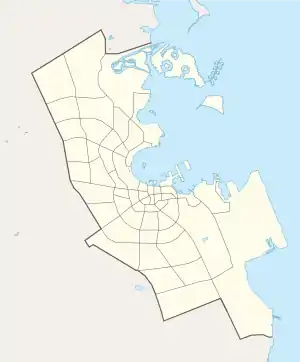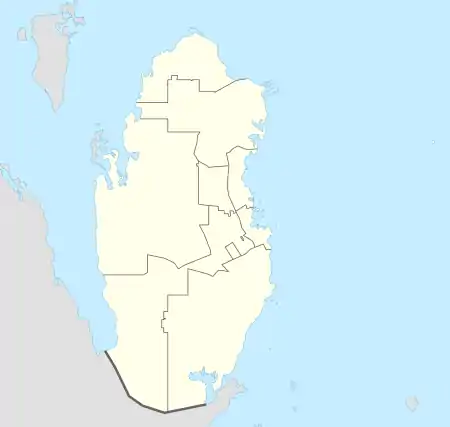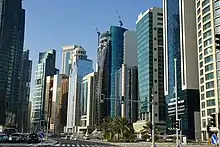Al Dafna
Al Dafna (Arabic: الدفنة) is a seaside district of the Qatari capital Doha located on the Persian Gulf.[2] The district is currently rapidly developing into a central business district, and since the late 1990s dozens of skyscrapers have risen in the district, with over fifty more planned. The district is also home to the City Center mall, one of the Middle East's largest malls.
Al Dafna
الدفنة | |
|---|---|
District | |
.jpg.webp) Skyscrapers in Al Dafna | |
 Al Dafna Al Dafna  Al Dafna Al Dafna (Qatar) | |
| Coordinates: 25°19′26″N 51°31′50″E | |
| Country | |
| Municipality | Ad-Dawhah |
| Zone | Zone 61 |
| District no. | 101 |
| Area | |
| • Total | 3.2 km2 (1.2 sq mi) |
The district was physically created in the mid-1980s following a massive land reclamation project along Doha's coastline, and started to develop in the mid-1990s. Currently, Al Dafna is rapidly becoming Doha's new downtown district, and with the massive amount of recent development towards the north of Doha; it is also rapidly becoming the new centre of the city.[3] Housing in the district is mainly up-scale and many foreign consuls reside here.[4]

Etymology
In Arabic, "dafna" roughly means "dredged land", a reference to the fact that the district was built upon reclaimed land.[5]
History
The decision to reclaim the land which would eventually become Al Dafna was first proposed in the 1970s after the government had difficulties in negotiating with land-owning tribes in downtown Doha. Rather than force the tribes to sell their lands, the government decided that the most feasible option was to initiate a massive dredging project along Doha's coastline. This project went underway in 1978 and lasted until 1981. American architectural firm William Pereira & Associates were hired to design the newly reclaimed area. Pereira's master plan was not wholly successful in its execution due to economic strains caused by falling oil prices in the 1980s, however, the 456-roomed Sheraton Grand Doha Resort & Convention Hotel built in 1979[6] and the Conference and Exhibition Centre inaugurated in 1982 were among his initial successes.[7] It was not until the late 1990s that the government would once again begin developing the district.[6]
Geography
Al Dafna borders the following districts:[8]
- Rumeilah to the south, separated by Mohammed Bin Jassim Street.
- Wadi Al Sail, Onaiza and Lekhwair to the west, separated by Al Bidda Street.
- Al Qassar to the north, separated by Dafna Street.
- The Persian Gulf to the east.
Attractions
Al Dafna features some of the most upscale hotels, restaurants and shopping avenues in the country. Additionally, it lies close to Hamad International Airport.[9] In addition, the Katara Cultural Village is situated in Al Dafna, which harbors theaters, concert halls, exhibition galleries and other facilities for multicultural activities and entertainment.[10] One of its attractions is an amphitheater, the Katara Amphitheatre built in an ancient style.
Transport
In the future, the underground Al Dafna Metro Station will serve the area. Construction will be launched during Phase 2B. Once completed, it will be part of Doha Metro's Blue Line.[11]
Education
The following schools are located in Al Dafna:
| Name of School | Curriculum | Grade | Genders | Official Website | Ref |
|---|---|---|---|---|---|
| Al Hekma International School | International | Kindergarten – Secondary | Both | Official website | [12] |
| Cardiff International Primary School | International | Primary | Both | N/A | [13] |
| SEK International School | International | Primary | Both | Official website | [14] |
References
- "District Area Map". Ministry of Development Planning and Statistics. Retrieved 1 March 2019.
- "2010 population census" (PDF). Qatar Statistics Authority. Archived from the original (PDF) on 2 April 2015. Retrieved 29 June 2015.
- "Planning in Qatar". catnaps.org. Retrieved 24 March 2015.
- Dena Qaddumi & Ameena Ahmadi (28 April 2017). "Scaling down planning in Doha towards the neighborhood and its public realm". QScience Connect. Special Issue on Shaping Qatar's Sustainable Built Environment. 2017 (1): 2. doi:10.5339/connect.2017.qgbc.2.
- Reem Awwad (January 2017). Assessment of neighborhood vitality in Doha (Thesis). Qatar University. p. 101. Retrieved 10 November 2019.
- Soud K. Al-Thani; Alexandre Amato; Muammer Koç; Sami G. Al-Ghamdi (2019). "Urban Sustainability and Livability: An Analysis of Doha's Urban-form and Possible Mitigation Strategies". Sustainability. MDPI. 11 (786). Retrieved 10 November 2019.
- Rickman, Maureen (1987). "Qatar". New York, NY: Chelsa House. pp. 54–55.
- "District map". The Centre for Geographic Information Systems of Qatar. Retrieved 30 November 2019.
- "Real estate demand to rise as infrastructure investment soars". The Peninsula Qatar. 22 January 2014. Archived from the original on 2 April 2015. Retrieved 24 March 2015.
- "About us - Katara". Katara. Archived from the original on 2015-07-22. Retrieved 2015-12-11.
- "QAR Metro". arcgis.com. Archived from the original on 4 December 2019. Retrieved 17 March 2019.
- "Al Hekma International School". Supreme Education Council. Archived from the original on 24 September 2015. Retrieved 18 July 2015.
- "Cardiff International Primary School". Supreme Education Council. Archived from the original on 2015-09-24. Retrieved 18 July 2015.
- "SEK International School". Supreme Education Council. Archived from the original on 24 September 2015. Retrieved 18 July 2015.
